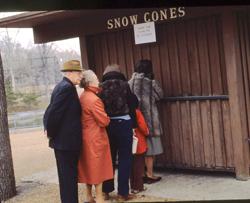 Having received a scanner for Christmas, I have been busy transforming old photos and slides into digital files. It is great fun, because it means rummaging through pictures taken decades ago. Some of them are priceless.
Having received a scanner for Christmas, I have been busy transforming old photos and slides into digital files. It is great fun, because it means rummaging through pictures taken decades ago. Some of them are priceless.
One of my favorites is shown here. The people in the photograph are my wife, two of my children, and my parents. We were at the St. Louis Zoo on a beautiful but chilly winter day, probably about twenty-five years, or more, ago. Strolling past the shuttered Snow-Cone stand, we noted the sign, which you may be able to read for yourself, perhaps, if you can enlarge the photo. It says, "Please form a line for better service." So we formed the line shown.
But there was no service, better or otherwise. We waited patiently, but no one came to assist us. After a while we drifted off, disillusioned.
Well, OK, we did it for a joke. In fact, we did it especially so that I could take the picture. It was one of those moments of simultaneous silliness: "Hey! See the sign? We better line up!" But although I’d forgotten about the picture, I often thought of the message: people do what they’re told.
Is lining up for better service, because a sign says so, any sillier than stopping your car because a sign says so? Common sense indicates that you approach an intersection with care, and certainly stop if traffic warrants. But to stop at three in the morning, with no other car in sight, is about as reasonable as our standing in line at a shuttered Snow-Cone stand in winter, because a sign indicated we should. You are there, at the intersection. Are you to set aside your own judgment of the situation as it actually exists, in favor of a blanket rule made by some legislature that had never been aware of the existence of the intersection?
Well, traffic "laws" aren’t particularly important, except for the revenue they raise. But we do what we’re told with regard to much more important matters. We meekly provide a picture ID at the airline check-in, although there may be no law actually requiring it. Presented with a tax form, we obediently complete it, and send it, with a check, to the government, simply because we’re expected to do so. On the assumption that we’re required, we may pay hundreds of thousands of dollars without once asking to see some law making us liable. If you do ask, expect a run around that will make your head spin. The message from the bureaucracy is clear: don’t bother us with questions, just do as you’re told.
Certainly society runs smoother when everyone doesn’t challenge everything! Unquestioning obedience makes military leadership possible, and parenthood survivable. And for the obedient, conformity makes it easier to get through life without causing waves. Without a doubt, however, tyranny thrives because of such human traits. Rulers know that if they demand something often enough, and loud enough, most people will obey, even if there is nothing behind the demand except bluster. And those who don’t will find themselves oppressed not only by the rulers so much as by their fellows: "Hey, I did it, what makes you think you’re better than me?" The rulers will bank on that attitude, too.
It’s a dangerous situation when those in power realize that, although they can make "laws" to justify whatever they want to do, it’s not really necessary. Laws, after all, are simply their wishes, arrived at after a certain procedure, and written down, which, in some mysterious way, makes them binding upon us. Invoke national security (never individual security!!), the environment, the economy, education, etc., and just issue "guidelines." Most will obey. A few may not, some claiming a right to "due process of law," when given an order by officials. What troublemakers! Don’t they know that the same organization that makes the laws, through one of its branches, has other branches that administer, enforce, and adjudicate them? Just assume that what you’re told to do is required, and do it, without making yourself obnoxious. Much of our society is based upon assumptions, many of them untrue, but so what?
For the curmudgeons among us: do you think you’d get better service if you formed a line and waited? Don’t waste your time. We tried that. Just walk away.
Dr. Hein [send him mail] is a retired ophthalmologist in St. Louis, and the author of All Work & No Pay.



